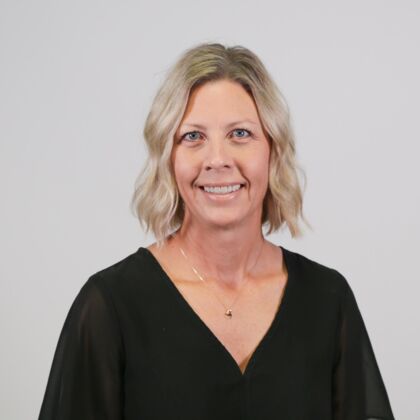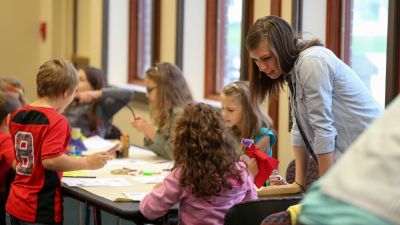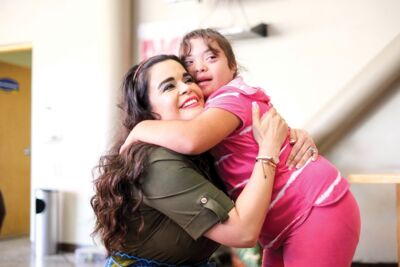
B.S.Ed. Special Education
Concordia Nebraska’s special education program trains you to serve individuals with mild to moderate disabilities, giving you the skills to address their specific differences, strengths and needs. With a degree in special education, you can ensure that students with disabilities will reach their highest potential in inclusive school environments.
Whether in the classroom or not, with a degree in special education from Concordia, you can find meaningful work within the branch of special education that speaks most specifically to your passions, strengths and long-term employment goals.
Find a career that is emotionally fulfilling and personally meaningful with a degree in special education!
Program Highlights
WHY STUDY SPECIAL EDUCATION AT CONCORDIA?
The special education program at Concordia University, Nebraska encourages students to be academic and spiritual advocates so that they can use their God-given talents to help children with disabilities develop to their full potentials morally, intellectually, socially and emotionally.
Certification
The undergraduate education programs at Concordia are approved by the Nebraska Department of Education and lead to a teaching certificate from the State of Nebraska.
Field Experience
To complete your required 100 hours of field experience, you will be intentionally placed in a variety of classrooms and schools throughout your four years here. That way, you get first-hand experience that aligns with what you are learning in your college classroom.
Student Teaching
Concordia is one of only a handful of universities that provides education majors with two unique student teaching experiences:
- 8 weeks student teaching in a local school
- 8 weeks student teaching in a different town, state or country
This approach provides education majors with diverse experience in a school setting with new students and teachers, often in a location they have never been to.
Special Education Program Director

Professor of Education, Special Education Program Director (Undergraduate), Department of Education Chair, Assistant Dean of the College of Education, Health and Human Sciences
Meet our students
“The professors care so much, and not only about us, but what we get out of it too. Just seeing how relational they are, it’s the kind of teacher I want to be as well. ”
Kylahn Freiberg
Nampa, Idaho
Accreditation
Concordia University, Nebraska is accredited by the Higher Learning Commission, a regional accreditation agency recognized by the U.S. Department of Education.
All education programs leading to teacher certification or endorsement are approved by the Nebraska Department of Education and the Council for Accreditation of Educator Preparation.
Degree Goals
An secondary education graduate from Concordia University, Nebraska will be able to:
- Demonstrate foundational knowledge in the research and theories of the characteristics of learners with disabilities.
- Use a wide range of instructional practices, approaches, methods and materials to support learning by students with disabilities and address the moral and ethical values that might affect instruction.
- Use a variety of assessment tools and practices to plan and evaluate effective instruction.
- Commit to knowing, understanding and applying the highest professional standards of special education.
- Create and support an environment that fosters learning and inclusion.
Optional Teaching Diplomas
Lutheran Teacher Diploma (LTD): For students who wish to be commissioned ministers who teach in schools of The Lutheran Church—Missouri Synod
Christian Teacher Diploma (CTD): For students who wish to teach in Christian parochial schools
International Teaching Diploma (ITD): For students who wish to teach in international schools
Field Endorsements
- Agricultural Education
- Art (K-12 Certification)
- Business, Marketing and Information Technology
- English Language Arts
- Mathematics
- Music Education (PK-12 Certification)
- Science
- Social Science
Subject Endorsements
- Biology
- Chemistry
- Geography
- History
- Mandarin/Chinese
- Middle Level
- Vocal Music (PK-12 Certification)
- Physical Education (PK-12 Certification)
- English
- Physical Education
- Physics
- Psychology
- Spanish
- Special Education
- Theology: Religious Education
Supplemental Endorsements
- American Sign Language
- Coaching
- English as a Second Language
- Information Technology
- Journalism and Media Education
- Speech
- Theatre
Career Outcomes
Special Education Teacher
- Teach students who have a wide variety of learning disabilities and challenges, including intellectual, emotional and physical disabilities
- Assess students through multiple and varied means of classroom assessment
- Focus on one or two subject areas
Reading Specialist
- Help schools implement quality reading instruction that meets the reading needs of students, including those in need of special education
- Teach reading skills alongside a classroom teacher to help them modify their reading curriculum to meet specific students’ needs
- You would need to complete a master’s degree in order to become a reading specialist
Speech Therapist
- Work to diagnose language limitations and speech deficits and develop treatment plans
- Perform evaluations to test mouth, tongue and throat problems and administer various standardized tests to identify neurological problems which may be interfering with speech or language
- Additional schooling is required to become a speech therapist
FAQs
What can I do with a special education degree?
Most people who earn a special education degree choose to become special education teachers in traditional or inclusive classrooms. That’s not the only option for you with a bachelor’s degree in special education from Concordia Nebraska, however.
As with most liberal arts degrees, your special education major can be incredibly flexible. With additional schooling, you might also choose to be
- an interventionist,
- a reading specialist,
- a school counselor,
- school administrator,
- curriculum designer or
- speech pathologist.
What are the certification requirements to teach special education?
You must hold a bachelor of science degree in education with an endorsement in special education to become qualified for a career in special education.
Although each state has different requirements for becoming a licensed teacher, special education teachers must generally pass the PRAXIS II certification exam after completing their bachelor’s degree in special education. Most certifications also require a certain number of hours spent in field experience and student teaching, which you will complete through your coursework at Concordia.
If you are a confirmed member of the Lutheran Church-Missouri Synod and wish to use your special education degree as a rostered member of the teaching ministry, Concordia Nebraska can help you obtain a Lutheran Teacher Diploma, which will make you eligible for a call in a Lutheran school.
If you would like to be able to teach special education in a Christian school that is not associated with the Lutheran Church-Missouri Synod, you may choose to receive a Christian Teacher Diploma, which will prepare you for your teaching ministry.
Is there a high demand for special education teachers?
Children with developmental disabilities are being diagnosed earlier in life than ever before. Many schools also integrate students with special needs into inclusive classrooms, making the need for teachers with special education training even more essential. Students who participate in special education programs are required to have an Individualized Education Plan, which almost always requires that they are taught by a teacher with a special education certification. Because of these factors, the need for special education teachers is very high.
However, most states report a shortage of certified special education teachers. Around the world, there is a growing need for those certified to teach students with diverse needs. You can help fill that gap by earning your degree in special education from Concordia University, Nebraska.
Related Articles
Related Programs

Behavioral Science/Sociology
In Concordia’s behavioral science program, you will study a combination of sociology, psychology and other social sciences to examine complex problems of human interaction and behavior. With this degree, you will gain skills that can be applied in many professions that require an understanding of people and their interactions from individual, group and societal levels.

Elementary Education
As an elementary educator, you are certified to teach children in kindergarten through sixth grade. You will typically spend the day with the same group of students, teaching them foundational skills in a wide variety of subjects. The liberal arts education you will receive at Concordia University, Nebraska, along with subject-specific methodology courses in the education department, will prepare you to be an outstanding elementary school teacher.

Secondary Education
With a degree in secondary education from Concordia University, Nebraska, you will be equipped to teach grades 7-12, encouraging intellectual and emotional growth at a critical time in the lives of your students. You’ll engage in rich coursework, collaborate with faculty and gain invaluable experience first shadowing a professional teacher and then teaching in your own high school classroom.

Psychology
The bachelor’s degree in psychology at Concordia is ideal for students seeking a strong theoretical foundation in the field of psychology. Offering a diverse psychology curriculum, Concordia Nebraska’s psychology professors use approaches that range from the scientific to philosophical and the experimental to the theoretical.
1 Recent graduates attending graduate school or employed within six months of graduation.

